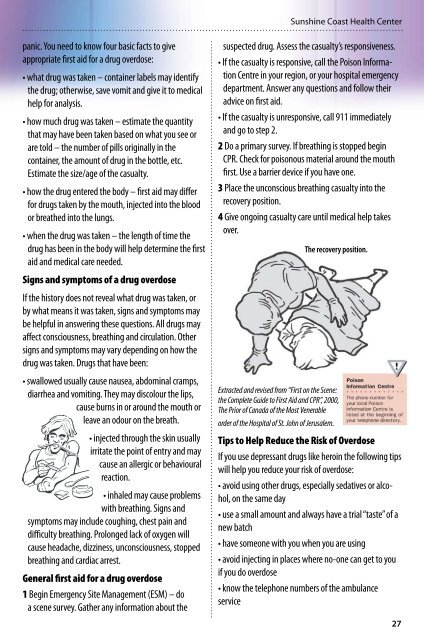Drugs Of Abuse - Sunshine Coast Health Centre
Drugs Of Abuse - Sunshine Coast Health Centre
Drugs Of Abuse - Sunshine Coast Health Centre
You also want an ePaper? Increase the reach of your titles
YUMPU automatically turns print PDFs into web optimized ePapers that Google loves.
panic. You need to know four basic facts to give<br />
appropriate fi rst aid for a drug overdose:<br />
• what drug was taken – container labels may identify<br />
the drug; otherwise, save vomit and give it to medical<br />
help for analysis.<br />
• how much drug was taken – estimate the quantity<br />
that may have been taken based on what you see or<br />
are told – the number of pills originally in the<br />
container, the amount of drug in the bottle, etc.<br />
Estimate the size/age of the casualty.<br />
• how the drug entered the body – fi rst aid may diff er<br />
for drugs taken by the mouth, injected into the blood<br />
or breathed into the lungs.<br />
• when the drug was taken – the length of time the<br />
drug has been in the body will help determine the fi rst<br />
aid and medical care needed.<br />
Signs and symptoms of a drug overdose<br />
If the history does not reveal what drug was taken, or<br />
by what means it was taken, signs and symptoms may<br />
be helpful in answering these questions. All drugs may<br />
aff ect consciousness, breathing and circulation. Other<br />
signs and symptoms may vary depending on how the<br />
drug was taken. <strong>Drugs</strong> that have been:<br />
• swallowed usually cause nausea, abdominal cramps,<br />
diarrhea and vomiting. They may discolour the lips,<br />
cause burns in or around the mouth or<br />
leave an odour on the breath.<br />
• injected through the skin usually<br />
irritate the point of entry and may<br />
cause an allergic or behavioural<br />
reaction.<br />
• inhaled may cause problems<br />
with breathing. Signs and<br />
symptoms may include coughing, chest pain and<br />
diffi culty breathing. Prolonged lack of oxygen will<br />
cause headache, dizziness, unconsciousness, stopped<br />
breathing and cardiac arrest.<br />
General fi rst aid for a drug overdose<br />
1 Begin Emergency Site Management (ESM) – do<br />
a scene survey. Gather any information about the<br />
<strong>Sunshine</strong> <strong>Coast</strong> <strong>Health</strong> Center<br />
suspected drug. Assess the casualty’s responsiveness.<br />
• If the casualty is responsive, call the Poison Information<br />
<strong>Centre</strong> in your region, or your hospital emergency<br />
department. Answer any questions and follow their<br />
advice on fi rst aid.<br />
• If the casualty is unresponsive, call 911 immediately<br />
and go to step 2.<br />
2 Do a primary survey. If breathing is stopped begin<br />
CPR. Check for poisonous material around the mouth<br />
fi rst. Use a barrier device if you have one.<br />
3 Place the unconscious breathing casualty into the<br />
recovery position.<br />
4 Give ongoing casualty care until medical help takes<br />
over.<br />
The recovery position.<br />
Extracted and revised from “First on the Scene:<br />
the Complete Guide to First Aid and CPR”, 2000,<br />
The Prior of Canada of the Most Venerable<br />
order of the Hospital of St. John of Jerusalem.<br />
Tips to Help Reduce the Risk of Overdose<br />
If you use depressant drugs like heroin the following tips<br />
will help you reduce your risk of overdose:<br />
• avoid using other drugs, especially sedatives or alcohol,<br />
on the same day<br />
• use a small amount and always have a trial “taste” of a<br />
new batch<br />
• have someone with you when you are using<br />
• avoid injecting in places where no-one can get to you<br />
if you do overdose<br />
• know the telephone numbers of the ambulance<br />
service<br />
27


